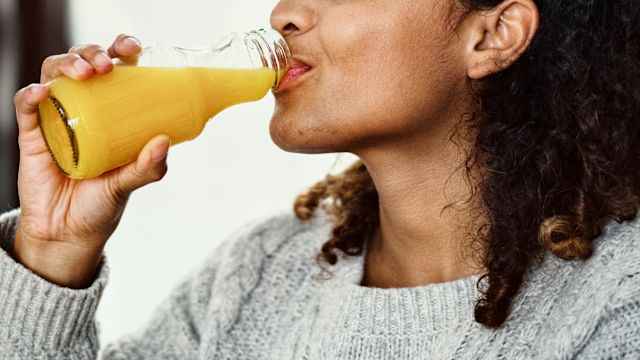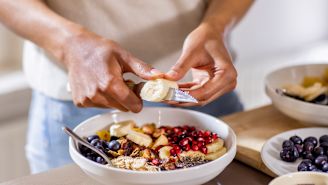Updated on January 26, 2026.
You may know that soda often contains a lot of sugar, and that eating too much sugar can be unhealthy. Research suggests it can contribute to kidney stones, tooth decay, weight gain, diabetes, and heart disease, among other conditions.
Many people looking for a sweet drink turn instead to fruit juice, believing it to be a healthier alternative. But fruit juices commonly have just as much sugar as the average soda, if not more. For example, 8 ounces of cranberry juice has about 33 grams of sugar, whereas 8 ounces of standard Coca-Cola has 26 grams of sugar. Even 100 percent fruit juice can have more calories than a can of soda.
Sugar and your health
Sugary beverages like fruit juice, soda, and sports drinks are in high demand in the United States. In fact, on any given day, about half the U.S. population will have a sugary drink. And that's not all: For 1 in 4 people, at least 200 daily calories come from these beverages, according to research from the Centers for Disease Control and Prevention (CDC).
Food manufacturers and marketers know this, and often try to disguise a drink’s sugar content. There are many different types of sugar, and it has many different names. So, when you read a product’s nutrition label, look for these tell-tale ingredients, which are often used as sweeteners:
- Corn syrup
- High fructose corn syrup
- Molasses
- Evaporated cane juice
- Dextrose, fructose, maltose, and other words that rhyme with “gross”
Added sugars should make up no more than 6 percent of your daily calories, according to the American Heart Association. For women, that's about 6 teaspoons each day. For men, it's about 9 teaspoons. Going over this amount on a daily basis increases your chances of health issues.
Due partly to the risks of added sugar, the American Academy of Pediatrics recommends that children avoid juice entirely before age 1 and be limited to 4 ounces of 100% fruit juice daily between the ages of 1 and 3. Children ages 4 to 6 years old should receive no more than 6 ounces each day. A better choice for toddlers and children is plain water.
So, if juice and soda aren’t wise choices for well-being, what are some alternatives that could offer health benefits?
Healthy beverage alternatives
Simply, water is the surest bet to quench your thirst and improve your health. Among other benefits, water:
- Helps your body maintain a regular temperature
- Keeps tissues hydrated
- Helps to get rid of waste through sweat and urination
- Prevents you from consuming extra calories and many artificial sugars
If you think water could use more flavor—or just want to switch it up—try adding lemons or limes. You can also make your own naturally flavored water. Simply mix the ingredients, let them sit in refrigerated water overnight, and enjoy chilled the next day. Try one of these three combinations:
- Strawberry and cucumber
- Orange and blueberry
- Watermelon and mint
Coconut water may be another good substitute for fruit juice, especially after exercising. It can rebalance electrolyte and carbohydrate levels and contains many antioxidants, which help to prevent cell damage. Coconut water is also high in in the mineral potassium, which assists in keeping your blood pressure in check. Just be sure to check the label of your favorite coconut water for added sugar.
Unsweetened iced tea, herbal teas, sparkling water, and flavored seltzers are other popular, low- to no-calorie options.
By choosing beverages like these over fruit juice, you'll save calories—and maybe even improve your health. Something to keep in mind next time you’re in the beverage aisle at the supermarket.







